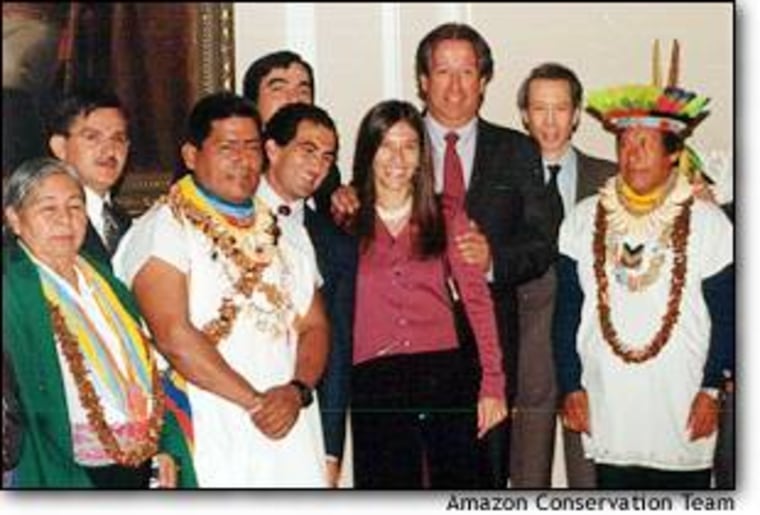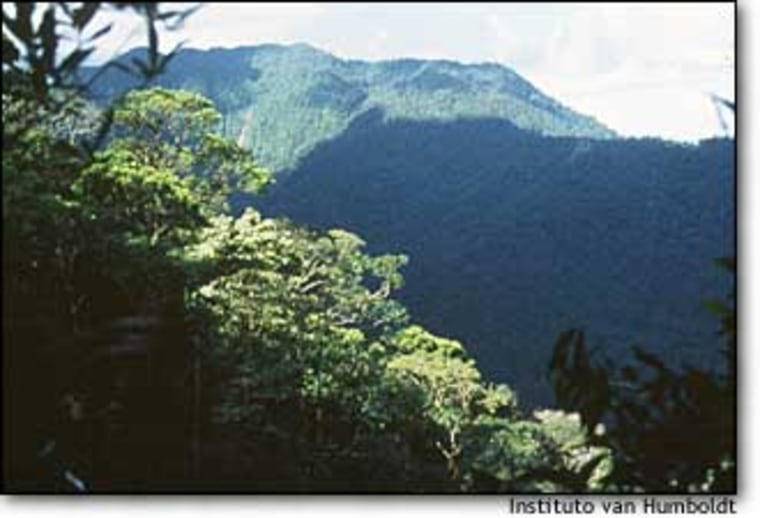Colombia has set aside a top environmental hot spot as a national park where remote forests, prized plants, rare species and sacred places will be managed by a most unusual group: the people who have lived there for untold generations. The conservationists who forged last month’s deal hope that the 167,960-acre park will serve as a model for indigenous groups throughout the Amazon basin.
Indiwasi National Park was created Feb. 25, after negotiations involving the Colombian government, the Association of Ingano Councils and the Amazon Conservation Team, a Virginia-based group focusing on projects to assist the Ingano Indians and other indigenous groups in the Amazon basin.
It took years for the deal to come together, said Mark Plotkin, president of the Amazon Conservation Team.
“If you ask the Indians, they’ll say about 500 years,” he joked. “But from our standpoint I’d say about three or four years.”
Inventories conducted by Colombia’s Instituto von Humboldt determined that Indiwasi National Park — formally known in Spanish as Parque Natural Nacional Alto Fragua-Indiwasi — is part of a region that has the highest biodiversity in the country.
“In terms of so-called hot spots, this is one of the most important in the world, (with) high biodiversity indicators and high spiritual values for indigenous people,” said the team’s chief operating officer, Liliana Madrigal.
The park provides a home for endangered animals such as the spectacled bear, rare birds such as the blue-rumped manakin and medicinal plants that could be of value to the outside world.
Sacred meaning
But in Plotkin’s view, the conservation plan is particularly important because it keeps the Ingano tribe’s sacred sites off-limits to outsiders. “It’s home to what they call ‘the invisible people,’ which may or may not mean uncontacted people in the area,” he said.
Under the terms of the decree, the Ingano will be the principal actors in the design and management of the park. “They all have to be indigenous people,” Madrigal said. “Because of the sacred nature of the park, it’s something that the elders are insisting upon.”
Colombia has 46 other national parks, including one that borders Indiwasi, but this is the first one where the indigenous people are in charge, according to the Amazon Conservation Team.
Like other tribes in the Amazon basin, the Ingano have developed a rich array of natural pharmaceuticals, including a hallucinogenic brew called yage that shamans use in their sacred ceremonies. There are riches also in the region’s old-growth tropical timber.
Plotkin, an ethnobiologist by training, hopes the park will provide a “historic precedent” for other tribes seeking to preserve their fragile biological and spiritual ecosystems from encroachment. There have been problems in the past: Colombia’s U’wa tribe, for example, became enmeshed in a ugly battle over oil exploration on its tribal lands.
“Let’s protect areas that are off the beaten track before they come under threat,” he said.
Future perils
Indiwasi — which means “house of the sun” in the Ingano language — could face future threats from Colombia’s leftist rebels and cocaine traffickers.
“It’s very remote,” Plotkin said, “but it is in (the state of) Caqueta, which is part of the drug war. I seriously doubt that that would be the case — but hey, who would have expected sleeper cells in New York?”
Robin Kirk, a researcher at Human Rights Watch who specializes in Colombia, agreed that although the park itself may not be a battleground yet, the wider region could be caught up in the twists and turns of the country’s narco-civil war. “I wouldn’t choose to vacation there. ... It’s just crawling with people you wouldn’t want to meet in a dark alley,” she said.
“If the guerrillas or the paramilitaries perceive that you support their enemy, that’s it for you,” Kirk said.

Plotkin and Madrigal said the Ingaro have been working hard to preserve their neutral status in Colombia’s conflicts, even though the park deal required the involvement of the Bogota government. President Andres Pastrana signed the decree on Indiwasi just days after the collapse of his negotiations with the rebels.
“Up until now, we haven’t had a single problem with any of the people we work with,” Madrigal said. “We always make it a point to keep our profile very much under the radar.”
Plotkin sees the new park as a bright spot amid the political wrangling over the fate of fragile ecosystems around the world — from the Amazon to Alaska’s Arctic National Wildlife Refuge.
“This is a point in time where we could all use some good news,” he said. “The environment is not just gloom and doom.”
